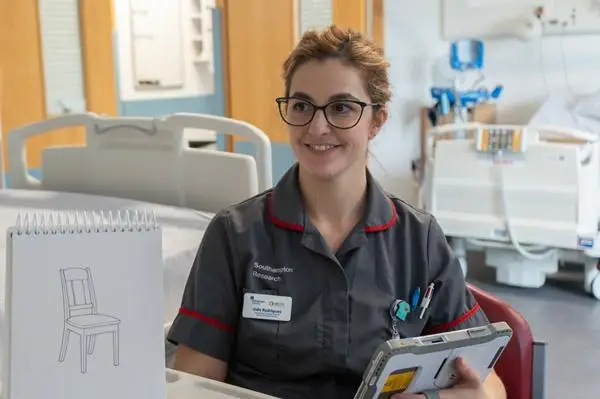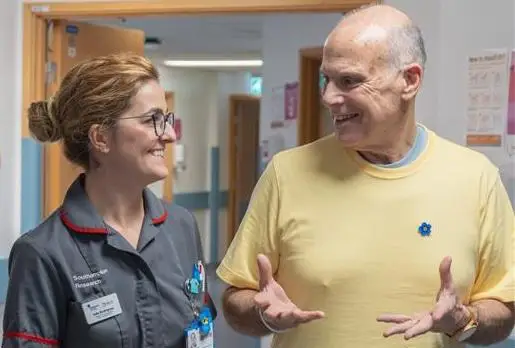Hampshire to expand dementia research
University Hospital Southampton is the first place in the UK to recruit a dedicated dementia research nurse as part of a new £3 million programme.
The investment from the Alzheimer’s Society is creating a fleet of research nurses across the country.
The programme is focused on boosting the number and diversity of people taking part in vital dementia research studies. Twenty sites across the UK are expected to be set up over the next two years.
Growing dementia research
Dementia is the UK’s biggest killer. One in three people born today will develop the condition in their lifetime.
Despite the urgent need to find new ways to diagnose and treat it, the Alzheimer’s Society warns that progress could halt due to low numbers of dementia clinical trials. This is creating limited opportunities for people to take part.
In the last five years in England, for every 45 people taking part in cancer clinical trials, just one person took part in dementia trials. This is a tiny proportion of the nearly one million people living with dementia in the UK today.
The figures are even more alarming for people from diverse backgrounds. Around 95% of participants in recent dementia trials are of White British/European origin.
Low awareness of clinical trials among people living with dementia are compounding these issues.
An Alzheimer’s Society and UK Dementia Trials Network (UKDTN) survey shows that around 80% of people with dementia were not told about research opportunities by their clinician. However, over 90% think that clinical trials and research should be discussed as a standard part of dementia care.
‘Making real change happen’
Inês Rodrigues is the UK’s first Alzheimer’s Society UKDTN Research Nurse to be in post in the new £3m programme.
Based at University Hospital Southampton (UHS), she has over a decade of clinical research experience.

Working closely with local hospitals, GPs, memory clinics, and community dementia services, Inês will focus on supporting a diverse range of people into clinical trials. This will ensure dementia treatments and care can work for everyone and no one is left behind.
She said: “Being one of the first ever Alzheimer’s Society UKDTN Research Nurses in the UK is both a privilege and an opportunity to make real change happen.
“My role will act as an expert guide for people with memory problems and those affected by dementia, to provide information, reassurance and practical support. This could involve delivering cognitive assessments, taking blood samples or administering medication as per the study, to help increase an understanding of research and improve participation experience.
“I want to ensure dementia research trials are visible and accessible across Southampton and the wider region, regardless of peoples’ background or circumstance. Dementia research has the power to offer hope, connection and progress. I’m proud to be part of a movement that’s turning that hope into action.”
Laura Rooney, Lead Research Nurse at Alzheimer’s Society, added: “We know people living with dementia are keen to take part in research but so few are offered the opportunity, whether at diagnosis or further along their dementia journey.
“We want to urgently address this by working to expand the number of clinical trials available to people living with dementia. This is important not only to help research progress, but because many people find it incredibly rewarding to know they are helping beat dementia by using their experience for a greater good. Research will beat dementia with Research Nurses increasing visibility and access to opportunities so that more people can take part.”
Taking part in Southampton
Alan, 69, lives with his wife in Romsey in Hampshire. He is taking part in a clinical research trial at UHS. This is seeking to test the effectiveness of a medicine that has been developed as a possible treatment for Alzheimer’s disease.

Speaking about his experience of taking part in the trial, Alan said: “After signing up to an NHS patient volunteer list, UHS reached out to ask if I would be interested in taking part in a clinical trial.
“I spoke to my friends and family about it, considered any risks, and I couldn’t come up with any reason not to take part. I have trust in the work that the NHS does.
“The assessment to take part in the trial was simple and accessible. There were three criteria I had to meet. I had to be over 60, have someone that could act as my trial partner, which I asked my wife to do, and complete a series of medical tests and scans to determine my risk of developing dementia. I also met with a clinician who walked me through the process and explained exactly what the trial involved.
“The quality of care that I’ve received has been excellent and at each check-in the clinician asks me if I’m happy to continue taking part. I was also asked to keep a daily log to record the time and date of when I take each tablet.
“Despite not having any prior concerns, results from the tests scored marginally in the ‘at risk’ category, but I feel better knowing. This is a great opportunity to take control of my future health and be part of a trial that could help me and others. I would recommend to anyone that if you’re able to contribute and help aid future research by taking part in trials now, to do it. This is for our future generations.”
Learn more about the new dementia research nurses at alzheimers.org.uk/research-nurses.